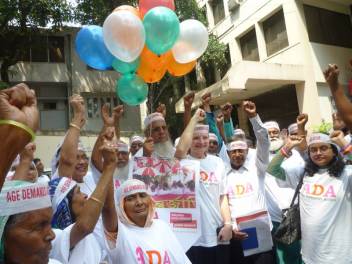 I recently contributed to the Web Managers Group blog on how we use social media in our work. The full blog is below:
I recently contributed to the Web Managers Group blog on how we use social media in our work. The full blog is below:
At HelpAge International, we come across amazing stories of older people in the developing world and their resilience on a daily basis. Our ongoing research also reveals astonishing statistics on global population ageing and its huge consequences for society.
Despite this, it can be challenging to engage audiences on these issues. One reason could be the negative stereotypes associated with ageing. Another may be the competition for digital space between NGOs; with many organisations (quite rightly) working to protect children and animals, older people often lose out!
Regardless of the reasons, I strive to overcome these obstacles; raising awareness of older people’s contributions and the hardships they face.
One of the most effective ways of doing this is through social media. Having started at HelpAge when our social media presence consisted of a (now defunct) Facebook page with under 100 supporters, we have grown our online communities across Twitter, Facebook, YouTube and other platforms.
Social media’s real-world impact
The first stage was to show the importance of investing in social media. To do so, highlighting the impact of early victories was crucial. After the 2010 Haiti earthquake, for example, we located a vulnerable older woman and were able to provide her with assistance thanks to an exchange with a Twitter follower.
Then we have, quite simply, concentrated on communicating our successes through older people’s words and stories. By sharing powerful images and video content we have organically built an online presence that has gone from being unranked to 88th on the Third Sector Online Charity Index in a year, which we were very happy with!
From stories to measurement – making sense of engagement
We can now also back up this approach through our monitoring, including audience feedback, tracking links and services such as Sprout Social. Indeed, it all points to the fact that sharing stories, photos and videos of the older people we work with and for is what our audiences enjoy.
Realising that real stories are what our online audiences want, we’ve moved away from centralised social media activities. We’re increasing the capacity of HelpAge staff across the world to communicate our work on the ground as it is happening. This is crucial to capture the authentic voices of those working with and for older people.
Embedding social media skills to amplify action
To do this, we have carried out training over Skype with HelpAge staff from Sudan, DR Congo, Pakistan and Haiti to name a few. These include helping staff set up profiles, giving guidelines on how to use social media sites and ensuring we have comprehensive lists of individuals and offices active online.
This translates into action in many ways. On days such as World Elder Abuse Awareness Day, our older campaigners meet their decision makers to demand their rights. This is then tweeted by our staff, or photos and videos are posted on Facebook and YouTube. This creates online momentum from offline action and highlights the urgency of our work. Storify is a useful tool to build an online narrative around these events.
Sharing expertise and reaching new audiences
We also hosted a Twitter chat with the World Health Organization on the theme of ageing. An ageing expert, geriatric nurse and an older campaigner from Europe, Africa and Asia sat with our staff, who helped them answer questions. The global reach of this activity was 20 million Twitter users.
Decentralisation comes with risks, however, including quality control. This is why we have put policies in place to ensure staff use social media appropriately and know the procedures in case of a crisis.
The next step for us is to now give our older activists the tools to get online and use social media to hold their governments to account. For now we’re conducting surveys with older people to find out their needs and carrying out research by taking part in digital inclusion projects for older people.
Watch this space! It would be great to hear from others who have run this kind of project here or internationally too.
